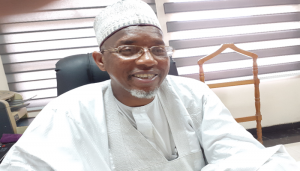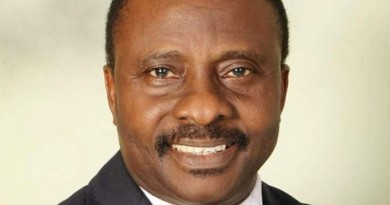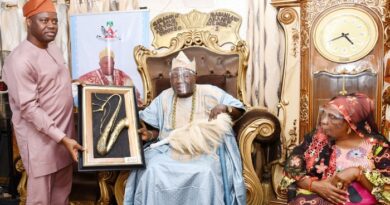Government policies should attract people to capital market – Kurfi
- Efforts should be made to encourage local investors back to the market
- PFAs should be mandated on mimimun to invest inequities
Alhaji Kasimu Garba Kurfi, a seasoned financial expert, the Managing Director and Chief Executive Officer, APT Securities and Funds Limited, was engaged by Business247News Online in an exclusive interview on the state of the nation’s capital market. In his characteristic manner, he gave indept responses to the questions, all geared towards having a better economy.
You are welcome.
How would you describe the nation’s capital market, would you say it is making adequate progress?
Even if we are making progress, it is not as much as expected because when you look at the volume of transactions, you will see that we are still below what we were achieving in the year 2008 and 2009, before the market meltdown. At that time, we were doing up to five billion daily transactions of shares, but today our transaction hardly hit more than two billion. So, for me, I cannot say there is much progress in terms of volume and value.
What do you attribute to this?
So many things are responsible. All exchanges, the world, over empower local investors because they are more reliable and once you have their backing, the foreign investors can walk in and go out as they like, there will be no problem. But today, we are almost 50 – 50, that is the ratio of local and foreign investors. Most of the times, when you see volume and value in the market, it is triggered by the foreign investors. For the local investors and high networth individuals, institutional investors such as PFA (Pension Fund Administrators) for long, they have run away from the market and are not in a hurry to come back and, therefore, the market finds it difficult to sustain momentum. It is interesting to note that these institutions control more than a trillion assets on the average; they can invest more than 25% of their assets. But today, PFAs have not been investing up to 5% of their assets. So, these are parts of the problems.
How can the government and capital market authorities bring the retail investors back into the market?
There is the need for a lot of awareness, road shows, media programmes to encourage investors back into the market. During the capital market boom, both the NSE (Nigerian Stock Exchange) and the SEC (Securities and Exchange Commission) had programmes on television and radio stations. By then, they would invite experts to discuss about the capital market and made it a live programme where people can call in and ask questions. Those programmes really helped the market to grow at that time. Today, they are no more. Therefore, the local investors have nowhere to get information about the market.
And it interesting to note that despite the falling of prices stocks, the market still gives opportunities through individual stocks. For instance LaFarge (i.e. WAPCO), in June this year was trading as low as N9.50, today it is trading at N16 per share. From June to now, you are talking of about three months. In three months, the stock gained 70 per cent and you can buy whatever quantity you want and can sell. Take for instance UACN also, the stock was trading in early September for as low as N3.50, but towards the end of the same month, it went as high as N8.00. That is a gain of over 60%. I can give you other stocks that are doing well.
With this, it is very obvious that if local investors are put in the picture of what is happening in the market, how they can benefit from the market, they would have been more active in securities trading and it would have been a win-win situation, more investors will come to the market and the exchange and operators will all be happy for it, but there is no such programme any more. I cannot remember when either the NSE or SEC called for investors’ forum nor have road shows in any other state outside Abuja and Lagos. So, the truth of the matter is that the NSE needs to be told that to attract local investors, we need to embark on road shows, go across the states, organise it from time to time, get radio programmes, have television programmes even if it is once in a week, invite the experts and let them talk about the market.
If we have something like that I believe the market will perform better and the local investors will be able to understand that because there was market meltdown in 2008, we cannot say because of that we will close it. I always make a reference to unemployment situation of the country. Will you say because of unemployment your child will not go to school?’ Nobody dare do that because by the time the opportunities come, you cannot benefit because you are not prepared, and opportunities can come anytime, anywhere. So, it is the same thing with the capital market. The capital market can go down and will rise and still perform better. I can tell you, last year Nestle went as high as N1,600 even during the meltdown. Go and check in 2017 May, Nestle was trading at N500.00. What does that mean? It further confirmed that individual stocks from time to time do rise and fall. If investors know this, they can trade and make money, but this awareness is lacking.
Coming to government, if you look at the Monetary Policy Rate (MPR) it has been at 14% for almost two years before it came to 13.5% when the inflation was at 11%. This shows that most of the investors will go to fixed income market because they are safer and better. You get your return over and above inflation rate. So, why will you take into risky business of equities when you can make it easy in Treasury bill. This is part of the problem, but we believe that the government can still promote this by encouraging and ensuring that quoted companies are more patronised. Today, most of our construction works go to the Chinese companies and none of these Chinese companies are quoted. The more these companies are patronised they will bother less about being quoted. What we are saying is that we should patronise those companies that are quoted more than those not quoted so that more of them will get quoted and this will be a win-win situation as whatever earned by the quoted companies will be redistributed, some of it to the shareholders, even if you are holding 100 units, you will benefit from it. For me, the Federal Government needs to come out with the policy that will make companies that are quoted get more patronage.
Not only that, it is a matter of policy. Ghana makes it clear, if you are not a quoted company, you will not roll out 4G and because of this policy, MTN went public and rolled out 4G even faster than other telecommunications companies in Ghana. But here, we give it free and many of them rolled out without being quoted. Now we are talking of G5, I hope the NCC (Nigerian Telecommunications Commission) and the government will look at this thing and say you can be allowed to go to G5 provided you a public quoted company. So, if we get such policy, it will encourage more companies to participate in the nation’s capital market.
Take the issue of Gencos and Discos none of them are quoted. We believe they have a role to play in making the nation’s capital market viable. This will be better for the economy and the market in general.
In the area of product developments, how would you rate the current leadership of the Nigerian Stock Exchange?
Well, they have generated many products but the truth of the matter is that there is little information about them. If there is adequate information many of these products will scale through and it will be better for the market and rather than investing in only equities, they will have options. For instance, there is Federal Government Savings Bond. Each month, FGs issued them and their rate is reasonably better because they are above 11%, at times they are 12%, 13% even 14%. Imagine, if you have a saving that pays you income regularly and with this rate, if there is awareness many people will not take their money to the banks because today if you take your money to the bank, you will have less return, they will give you 3% or 4% compared to 11%, 12%, and 13%. The beauty of FGN savings bond is that any time you need money, you can come to the market sell and realise your money instantly. For me, the products are there, but there is no adequate information about them to encourage people to know and take advantage of them.
Take the Exchange Traded Fund (ETF) for instance this is derivative because they rely on the existing shares, but as I am talking to you, I have a substantial number of it, but I hardly trade it because there is not enough awareness. I remember when they came with Gold Traded Fund, it was related to international price of gold, but look at our market, it is not behaving well. The same thing applies to so many other products that were produced without carrying the brokers along. Without taking it to the public, they usually dead on arrival and that is why despite many of the exchange traded funds that have been introduced, only very few are known to the investors.
How can the PFAs be made to invest more in the market?
If the Federal Government wants the pension fund to participate more in the market, they can do so. If you look most of the Federal Government Bonds and Treasury Bills, you will see that the PFAs acquire it and participate in them. In terms of equity, the policy stated the maximum they can invest and no more, but the policy forgot to give them the minimum and therefore they end up doing nothing. You say that in the policy you are allowed to take equity investment of 25% but no minimum was given and because they were told the minimum they must invest in equity, you discover that most of them don’t even bother to invest in equity, you discover that most of them, they don’t even bother to invest up to 1%. I expect the policy makers to not only give them the maximum; they must be given the minimum they must not go below. There should be a minimum threshold that they must not go below. This is really affecting their participation in the market.
Nigeria’s foreign reserve at mid October was about 4 trillion, what does that mean for the market and the economy at large?
Once your foreign exchange reserve is rising, it brings confidence to foreign investors. They are not only looking at the opportunities in our country, but they are also looking at if I realise my investment opportunity, how do I get it out, if I want to? They are not interested in naira, what they are concerned with is do you have the reserves, if I do business with you, can I get paid? Of course, higher reserved given mores confidence to investors, but that is not enough. How much do we generate internally and this is where you see our short comings. We have good foreign reserve but I can tell you more than 90% is through oil sales, technically it means, if oil price crashed, our reserved is not sustainable. So, we need to sustain our reserves by not only foreign exchange but through remittance. I learnt that one year; about 28 billion dollars were remitted to Nigeria. So, remittance into Nigeria gives more confidence, so it is good to have higher reserve, and higher remittance.
How do you think the CBN can be managed in the interest of all financial markets, and not basically the money market?
Well, the truth remains that once the MPR (Monetary Policy Rate) is high people will prefer to invest in treasury bills rather in equities because there is certainty there and you are sure of getting the return especially when the rate is higher than inflation rate. So, it is good for the CBN to see from time to time that MPR is reviewed downward if they do that investors will have the opportunity of oscillating between equities market and money market instruments.
In terms of new listing, how would you rate the NSE performance, bearing in mind that the MTN was more or less constricted to list on The NSE?
You see, The Exchange management has to wake up and reach out. We have many companies that we know are doing well but today they are not quoted, why? Nobody has convinced them of the advantages of being quoted. If you go to oil sector, you will see Sahara Petroleum, you will see many of them which in terms of size are even bigger than most of the quoted ones. Go into manufacturing, the situation is the same. You want to wonder why being quoted on The Exchange is not attractive to Innoson Motors and the likes. This gigantic project can be quoted. So, many other projects that should encouraged to get quoted so that this will encourage more companies to come to the market. That is lacking.
But how much can the exchange on its own do to see that these companies come to the market to list without government policy compelling them?
It is good to go back to history, by 1961 when the exchange started operations, there were 13 securities, four companies and 9 debt securities. Nothing changed in the capital market until 1973 when there was a decree that many companies had to divest their holdings, with UAC at time, gave one million shares to each of the 12 states of the federation. That was what brought Lafarge into the market and many other companies. To me, this is an area we need to look at. If we address it the market will be better.
Government needs to come out with incentives and at times, there can be tax relief so for some time. This will encourage many companies to be quoted. In Nigeria today, there are so many companies that are household names, but are not found in the market. That will tell you that we still have a long way to go.
Is it lack of understanding of what the nation can gain in a vibrant capital market, that is preventing our policy makers from making policies that would propel the market growth?
Well, even if the understanding is there, it is not put in to use because when you put it in to use, it will have effect. Our market was tuned around by 1973 decree. Through it many companies like Nestle, Tatal, Mobil, Africa Petroleum, among others, got quoted and by 1990 when the Bureau of Public Enterprises (BPE) started divesting from First Bank, Union Bank, UBA and others. The market became more vibrant with their coming to the market.
Now, the increase of VAT from 5% to 7.5%, how do you see this affecting the market?
It will lead to increase in the cost of market activities, simple. Prior to June this year, we (Capital Market) had a relief from VAT over the past five years that was during the time of Ngozi Okonjo-Iweala as minister of finance. We sought the president weaver for a period of five years. During this period, there was no VAT on capital market transactions. This ended 21 June 2019 and now every transaction you have to pay VAT. The VAT you are paying also is not 5% but now 7.5%. It is an additional cost to the investors, from free not only to 5% but now to 7.5%. This will have negative effect on the market because most of the foreign investors look at the cost of transactions. They are always bothered on what does it cost them to play in the Nigeria market. Already, we have brokerage fees which is about 1.35%, we have SEC fee which is 0.35%; NSE, 0.3% then CSCS fee 0.3% stamp duty 00.75% plus 7.5% VAT now.
Is still possible government still give the weaver to the market to encourage investor?
Well, from what we have seen, it will be very difficult to reverse it. Nigeria is the only country in sub Sahara Africa that generate less than two digit of its income as part of its expenditure so, when the expenditure keep on rising, the income is not growing, it is likely going to increase the cost and most investor run away from additional costs. So, these are the issues
How would you describe shareholder association groups? Are they having positive impact on the market today?
For me, most of the shareholders association members are just living for themselves because since the incorporation of shareholders association which was done by late Hamzat Zayyat after privatisation, was structured in such a way to empower minority shareholders. Zayyat was the DG of BPE then. He introduced this shareholders association so that their interest will be protected. Later late Akintunde Asalu and others came and they started their own.
Today, we have so many shareholders associations that are not attached to any zone. They take it as a full-time business and they harass CEO of companies to pay for their flight ticket to the venue of AGM and once the companies do that, they are willing to say yes to whatever the company wants at the AGM. You hardly go to the AGM and see them challenging any decision of the management and board, because in most cases, they are compromised and this is what is prevailing in the Nigerian Capital Nigeria market today.
Where did you see the market ending the year?
I see the market closing in the year negative because already we are in the negative of about 13 per cent where we were before the listing of MTN. Because MTN is a giant and because of it substantive gains the market losses were reduced to 1.2% by the end of June. However, Airtel got listed and instead of rising, it came down and other stocks followed and thereby keeping capitalization down. As I am talking to you, All-Share Index has lost about 15% and we need magic to turn around this one. Even now that the companies started listing their third quarter results, instead of the price going up, it is going down or remains on the same spot. We can say that the market is likely going to close negative except if the president make true his promise to release N600 billion for capital expenditure from now to December. It will also help if the national assembly keep to their review, re adjust and approve the budget before the year ends that will enable the presidency to keep its promise.
With further release of third quarter results, hopefully the loss will be reduced to around 13% or less, but with new policy it will be very difficult to achieve this. Because the major capitalised stocks like MTN, Nestel, Airtel, GTB are down and moving them their prices up or down has been very difficult . These five companies control about 70% of the market capitalization and now you are saying that their price can’t be moved until you have 100,000 units. For me, it is a good policy implemented at the wrong time. The policy should have come when the prices of most of these blue-chip stocks were still high, let say at the line that Nestle was at N1,650 per share, same with others. Now they are all down. Nestle in trading at N1,200, MTN is trading low. With all this stocks down, and now you are coming with this policy, it will be very difficult to move the stocks back to where they are supposed to be because the stringent conditions to move them and they are not likely to recover these losses before the end of the year.





